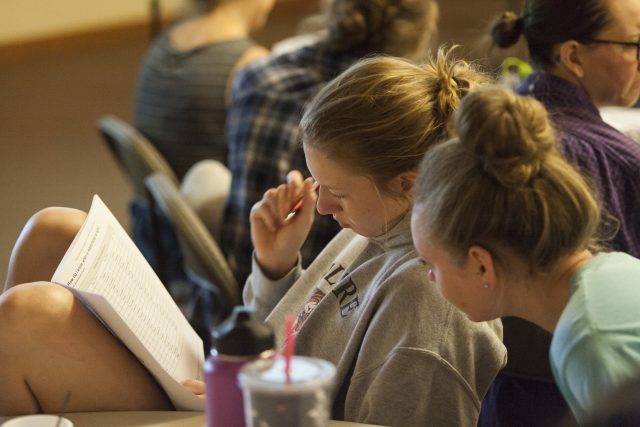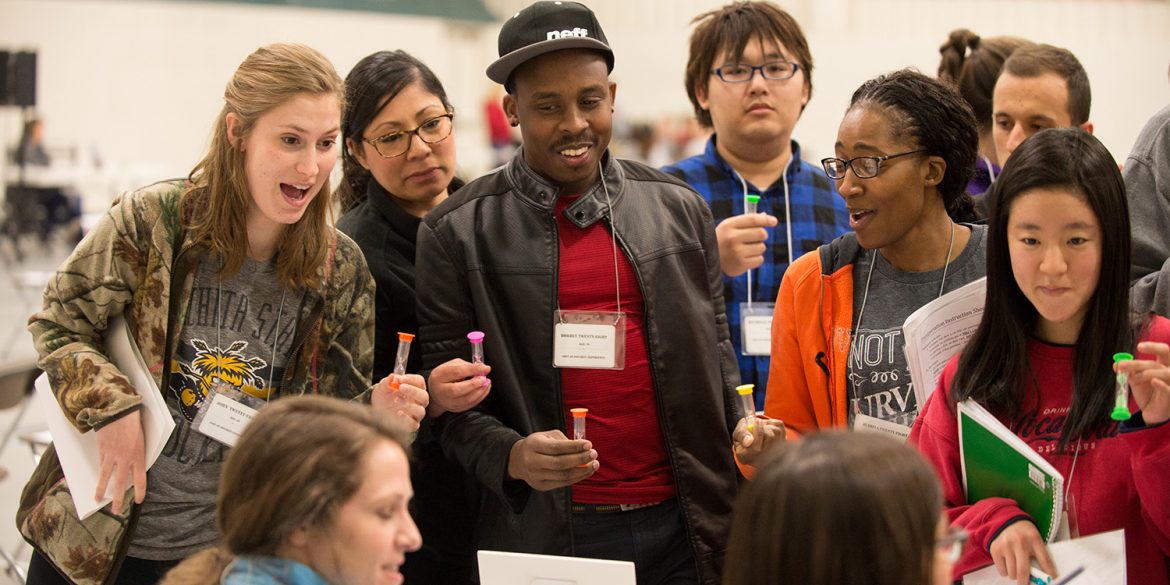Most of the time, hands-on experiences for nursing students mean spending time in the different units of hospitals learning how to treat patients who are ill or recovering from a variety of ailments and procedures.
For Hesston College nursing students, hands-on experiences also break out of the confines of a medical facility and into the community giving students opportunities to work with populations and issues they may not otherwise encounter.
In their final semester, Hesston College senior nursing students take Population-based Nursing, a course that gives them opportunities to look at a population’s environment, socioeconomics, health practices and other factors that contribute to overall health and wellbeing. The students are able to go hands-on within the population to address needs and concerns they discover through observations and determinations to help improve quality of life.
“All BSN programs have some component of population-based nursing,” said professor Duane Miller. “What is unique about Hesston’s approach is the cohort model. I have not yet found another program that does it this way.”
In many nursing programs, population-based nursing is an individual preceptor model where each student is assigned to a nurse to follow and observe in the populations he or she serves.
With Hesston’s model, which just completed its second year, eight to 10 students were assigned to a social service clinical location where they are guided by the staff and a clinical instructor and work directly with the population served.
“We didn’t want just observational, fly-on-the-wall experiences,” said Miller. “With population-based nursing, we’re not focusing on one-to-one care. We want to take our expertise as nurses and connect with our community. So we tried the idea of partnering with social service agencies and it has worked out really well.”

Students dispersed into the community to places like Kidron, Inc. (North Newton) and Hickory Homes (Hesston), both income-based housing for elderly people, Circle of Hope (Newton), a relationship-based initiative through the Peace Connections organization that seeks to improve the financial health and well-being of the community, New Jerusalem Misisons (Newton), which provides physical, emotional and spiritual support to individuals living with AIDS, and even the Hesston College campus.
The result was students thinking outside the box to address the needs they perceived and making connections they may have otherwise missed.
“When we started Population-based Nursing I was really only thinking about like a health clinic and the nurses there who give immunizations all day,” said Rebekah Voran, Kingman, Kan., who served at New Jerusalem Missions. “I was kind of confused at how we were going to have an entire class about just a health clinic. It’s obviously a lot bigger than that, and now I see how the smallest things – like even cracks in the sidewalk – are a nursing issue. Are the streets good enough for people to walk on so they don’t fall and get hurt? Are there crosswalks where there need to be? I see now how that’s definitely a nursing issue.”
“The American Nurses’ Association is really pushing that we have more nurses involved in our communities, including serving on boards and things like that,” said Miller. “Nurses have a lot of knowledge and expertise and we can use that to help our communities. That’s what I hope the students saw at the end of the day. I’m hopeful they’ll be active in their communities.”
As students became acquainted with the organizations they were working in and the people they were serving, their creativity flowed to meet the needs they found.
At Hickory Homes, the students helped compile a cookbook with recipes that are affordable and simple for residents to make. At New Jerusalem Missions they helped improve the facilities for more comfortable living and assisted with food preparation. And on the Hesston College campus, one group addressed education about epidemics or disease spread after the campus was hit with several rounds of illness that affected dozens of students, focusing particularly on hand hygiene. Another group observed a need for education on healthy relationships, and brought to campus an expert in the field, Dr. Joanne Davila, professor of psychology and director of clinical training in the Department of Psychology at Stony Brook (N.Y.) University, to lead a relationship workshop with both Hesston College and Bethel College (North Newton) students. Students also participated in poverty simulations, through Peace Connections, that put them in simulated situations to better understand the effects of poverty on all areas of life.
“For us to add value, we don’t want to add something new that the community doesn’t actually want or need or start something that isn’t sustainable,” said Miller.
That’s another reason working with the nonprofit organizations was beneficial – they are already established and serving the population and the students were able to step in and find ways to make what’s already working even better.
“I’ve always thought if we can structure clinical in a way that students can really practice to the extent of their education and training and then find ways that connect with their passions, we could benefit both the college and the community and the student,” said Miller.
And that’s exactly what happened.
“This experience showed me how to better help my community,” said Dacia Hightower, North Newton, Kan., who served at New Jerusalem Missions. “It showed me how to speak out or find ways to assist people with their needs.”


